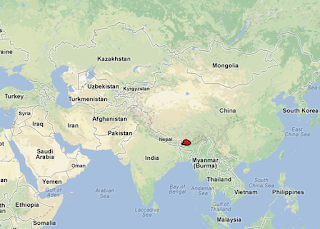Many of you have asked me who my neighbors are, where they're from, and why they're here. I've decided to spotlight some of them for you, starting with the Bhutanese.
At a glance:
Country of origin - Bhutan
Refugee camp country - Nepal
Primary language - Nepali
Primary religion(s) - Hindu (some Buddhist, a few Christians)
Primary reason for leaving their home country - Ethnic oppression
Total number of refugees - Almost 58,000 as of Jan 2012
Resettled in Charlotte* - More than 2,200 as of Dec 2012
Although it's true
when I say that the refugee population in Charlotte is from "all
over"—including people from Burma, Vietnam, Somalia, Iraq, Eritrea, Congo,
and Afghanistan, among several others—most of the new arrivals, including
almost all of my neighbors, are from Bhutan.
Many Americans mistakenly call these people Nepali instead of
Bhutanese, and the confusion is understandable.
My neighbors speak Nepali, not Dzongkha (the official language of Bhutan). They wear Nepali clothes
and practice Nepali cultural customs. Ask any of them, though, and they
will tell you clearly and proudly: they are from Bhutan. Not Nepal.
So, how did they get here?
Bhutan is a small country in south Asia, north of India and Bangladesh and east of Nepal.
In the
late 1800s, people from Nepal began migrating into the farmland in southern
Bhutan. They didn't have very much
contact with the Bhutanese in the north, so they retained their Nepali
language, culture and religion. The cultural
differences didn't really cause conflict, though, at least at first, and Bhutan
became their home. By the mid-twentieth
century, they considered themselves thoroughly Bhutanese—they were simply ethnically
Nepali Bhutanese instead of ethnically Bhutanese Bhutanese.
In the 1980s, though, the Bhutanese ruling majority began to feel
threatened by the growing number of Nepali-speaking "Lhotsampas"
("People of the South"), and began a campaign of "Bhutanization":
they outlawed the Nepali language, instituted dress codes, stripped many of the
Nepali-speakers of their citizenship (or refused to recognize that they had
ever had it in the first place) and civil rights, and removed them from
positions of political and cultural influence.
Protests in the late 1980s and 1990 led to violent encounters between
the two groups, and in 1990 tens of thousands of ethnic Nepalis were forced to
flee the country into Nepal and India.
Since 1990, thousands of Nepali-speakers have been sitting in
refugee camps, waiting to be allowed back into Bhutan.
If they are ethnically and culturally Nepali, you may ask, why don't they just settle in Nepal? Two of the simpler reasons in this complex issue: 1) the Nepali government won't let them integrate (refugees are rarely allowed to leave the camps or hold jobs), and 2) they don't want to settle in Nepal, because they aren't Nepali. They're Bhutanese. (Being "American" is a huge part of your identity, right? This would be roughly like the White House suddenly telling you and all your neighbors that you're not Americans and aren't allowed to live here anymore, because your ancestors came from (we're pretending) Canada a hundred years ago. Even though Canadians speak English and share some cultural similarities, would you shrug and say "Fine, okay, I'm Canadian now"?)
Unlike many other refugees who know they have
left their home countries permanently and are relatively eager to leave camps
and resettle, ongoing (yet fruitless) talks between the governments of Nepal and
Bhutan and the UN have left most of the Bhutanese refugees in limbo—with just enough hope that
they'll be allowed to return home that they are reluctant to resettle into new
countries. They want to be ready and
nearby "when they are allowed back into Bhutan." Many Bhutanese refugees also seem to see third-country resettlement as a political and cultural insult. For them, a return to Bhutan is the only just—and therefore the only acceptable—outcome.
Some of them, of course, are glad to leave the camps for America. One of my Bhutanese neighbors is my age, and wanted to come—she's excited about learning English and the educational and job opportunities
here. She came, though, with just her
aunt. The rest of her family wanted to
stay near Bhutan. She doesn't think they'll ever come to join her.
All refugee situations are sad, but something about the Bhutanese
story is particularly sad to me. I think
it's the sense of lingering, unrealized hope—it's almost certain that they won't be
allowed back into Bhutan, but not so certain that the hope has really
died. They keep getting told,
"maybe soon," which, to me, sounds like the worst place to be. I would rather just be told flat out that I couldn't
go back, so I could be free to move on. Maybe
it's my American need for closure.
I honestly don't know the individual stories of most of my
Bhutanese neighbors at this point. Most
of them aren't proficient enough in English to really tell me yet. I don't know whether the majority of them
actively wanted to resettle in America or were pressured into it.
What I do know? I know that most of them are farmers (and that they find my lack of agricultural knowledge both appalling and hilarious). I know that many (although not all) of them are Hindu. I know that many of
them have seen and suffered horrible things. I know that many of them find city life overwhelming at times (even though
America and Charlotte are usually both "good! [big grin]"). I know that they almost always smile at me and that they love their children and grandchildren.
And I know absolutely for certain from every one of them—limited English or not—that they are Bhutanese. Not Nepali.
----------



